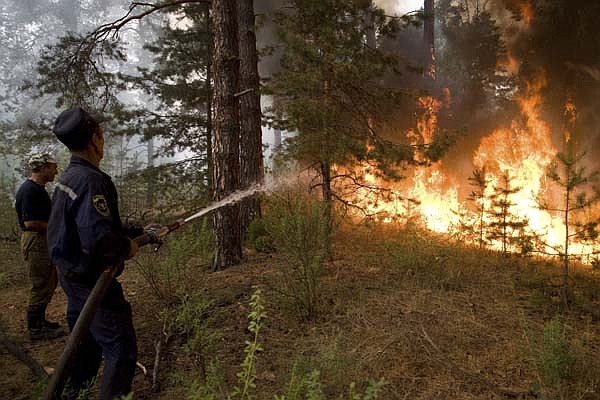MOSCOW — Acrid smoke from forest and peat-bog fires east of Moscow shrouded the city Friday, causing flight delays and raising pollution to “very dangerous” levels.
As many as 140 flights were delayed Friday as visibility at the capital’s airports was reduced to as little as 1,148 feet Friday morning. Visibility improved “significantly” in the afternoon and planes “gradually began to return to airports and fly out,” Sergei Izvolsky, a spokesman for the Federal Air Transportation Agency, said by telephone.
Carbon monoxide in Moscow’s air rose to as high as 4.8 times the admissible maximum level before tapering off slightly toward evening, the city’s environmental protection department said on its website. The Health Ministry advised Russians to stay indoors, limit physical activity and wear masks when venturing outside.
Emergency crews battled 558 fires covering 693 square miles across Russia, the Emergency Situations Ministry said on its website Friday.
So far this year, fires have scorched 2,818 square miles, an area about three times the size of Luxembourg, according to the ministry.
The fires have killed at least 52 people, the Health Ministry said.
The smoke plume from Russia’s fires spanned about 1,860 miles from east to west as of Wednesday, according to the National Aeronautics and Space Administration.
“If the smoke were in the United States, it would extend approximately from San Francisco to Chicago,” NASA said on its website Thursday.
Temperatures as high as 108 degrees will continue to plague central Russia and along the Volga River, where the fires are concentrated, at least through Sunday, the state Hydrometeorological Center said on its website. “Extreme” fire danger is forecast for many regions, the center said.
The military may press negligence charges against the commander of a paratrooper supply base in the Moscow region that was partially destroyed by fire, Interfax reported Friday, citing a statement from prosecutors. Strong winds whipped up the fire on July 29, scorching a warehouse, the news service said.
Earlier this week, President Dmitry Medvedev fired senior navy officers for “criminal negligence” after a base near Moscow was gutted by fire.
The naval aviation supply base near Kolomna, 69 miles southwest of Moscow, burned on July 29, destroying the headquarters, 13 warehouses and 17 parking lots with vehicles, according to the Investigative Committee of the Prosecutor General’s Office.
Agriculture is the hardest hit part of the economy, with the government declaring a state of emergency in 28 crop-producing regions and grain yields down 20 percent this year.
Agriculture accounts for about 4 percent of gross domestic product, according to Moscow-based VTB Capital.
The Russian government may delay the start of the school year because of the heat, Interfax reported, citing Gennady Onishchenko, the country’s public health chief.
Onishchenko said school should start as usual on Sept. 1, though authorities may have to consider pushing classes back if the heat wave doesn’t break and smoke from forest fires doesn’t dissipate in the cities, the news service reported.
Ken Donaldson, professor of respiratory toxicology at the University of Edinburgh, said people with asthma, bronchitis, lung disease or heart problems were the most vulnerable to the smog.
“For people with underlying health problems, the particles in the smog could be the straw that breaks the camel’s back,” he said, causing them to have a serious lung problem or a heart attack.
He said concentrations of carbon monoxide, even at four times higher than normal, was not alarming unless people became trapped in an enclosed space.
The more dangerous gases are ozone or sulfur dioxide, he said, but those are not usually produced by burning.
On Thursday, Russia, the world’s third-biggest grower of wheat, banned grain exports from Aug. 15 to Dec. 31 as the country’s worst drought in half a century cuts yields.
Information for this article was contributed by Jim Heintz, David Nowak, Mansur Mirovalev, Arthur Max and Maria Cheng of The Associated Press.
Front Section, Pages 2 on 08/07/2010
